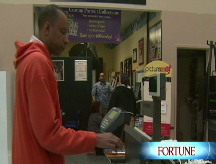The dark side of lower prices
The credit crisis and stock market roller coaster has some Americans worried about a depression. But economists fret about another D word - deflation.
NEW YORK (CNNMoney.com) -- Stock prices have plunged in recent weeks. So have oil prices.
Most Americans probably see the former as terrible news and the latter as a ray of sunshine at a dark time.
But both could contribute to a growing concern among economists - deflation.
Simply put, deflation is the opposite of inflation: It's when prices for a wide range of products start falling, rather than rising.
And while consumers struggling with the high cost of gas and food might think the idea of deflation sounds attractive, economists almost universally agree that it would be very bad news.
"When prices start to fall because of lack of demand, they can go well below the cost it takes to produce products," said Bernard Baumohl, executive director of the Economic Outlook Group. "Companies have no alternative than to cut back production and lay off a lot of workers. That cuts demand more. You get this vicious downward spiral in prices."
Most economists point out that the current economic conditions do not yet suggest that deflation is present, or even imminent.
The Consumer Price Index, the government's key inflation measure, did show no rise in prices in September. But prices are still up 4.5% over the past 12 months.
Baumohl puts the risk of deflation about 10% to 15%, and no more than 20%. But he said only a month ago he would have thought the risk of deflation was less than 5%.
The credit market crisis, combined with the recent stock market declines and the plunge in home values over the past two years, is setting off the deflationary alarm bells for economists.
Paul Kasriel, chief economist with Northern Trust in Chicago, said most bouts of deflation have started with sharp declines in assets such as stocks or homes. That has tended to lead to a loss of value of collateral for loans and ultimately, large losses by lenders and very tight credit.
"I still don't think deflation is going to happen," said Kasriel, who puts the chance at between 10% and 30%. "But these are the initial conditions that lead to it."
In the United States, the worst period of deflation was the Great Depression.
While a recent CNN poll found 59% of Americans thinking that another depression is likely, most economists dismiss the threat of a depression. But they say deflation is something that gets them worried. And they are very careful using the word.
This week, San Francisco Federal Reserve Bank President Janet Yellen broke a taboo among Fed officials when she said in a speech that the economy "appears to be in a recession."
But in the same speech, she was reluctant to use the word deflation, even though she danced around the concept. She said falling commodity prices, job losses and weak demand for products were likely to "push inflation down to, and possibly even below, rates ... consistent with price stability."
Her reluctance to say deflation, even in a speech notable for the use of the word recession, doesn't surprise economists.
"Deflation is very scary, scarier than a recession, because once you get into it, it's hard to get out of," said David Wyss, chief economist for Standard & Poor's.
Wyss said deflation doesn't have to lead to a 1930s style depression, with double-digit declines in economic activity and unemployment of 25%.
But it can lead to the kind of extended economic pain seen in Japan's so-called "lost decade," a period that left Japan with little economic growth from the early 1990s until the middle of this decade.
"The Japanese had deflation during their lost decade when their banks were unable to create credit," said Kasriel.
The Fed's attention to the rising threat of deflation is encouraging, Kasriel said. The central bank has pumped hundreds of billions of dollars into the financial system to try to spur lending and support spending and prices.
This is a sign that inflation is no longer a concern for many Fed policymakers.
"It maybe premature to worry about deflation but it's long past the time to talk about inflation," Wyss said.
Kasriel added that American consumers should be concerned about deflation as well - even if lower prices sound like a good "problem."
"Sure, you feel like you're on top of the world when you pay less than $3 for gas," Kasriel said. "But it's not because we've discovered new oil reserves. It's because demand is very weak. It's a symptom of a global recession rather than a cause for hope of a quick recovery in the economy." ![]()



